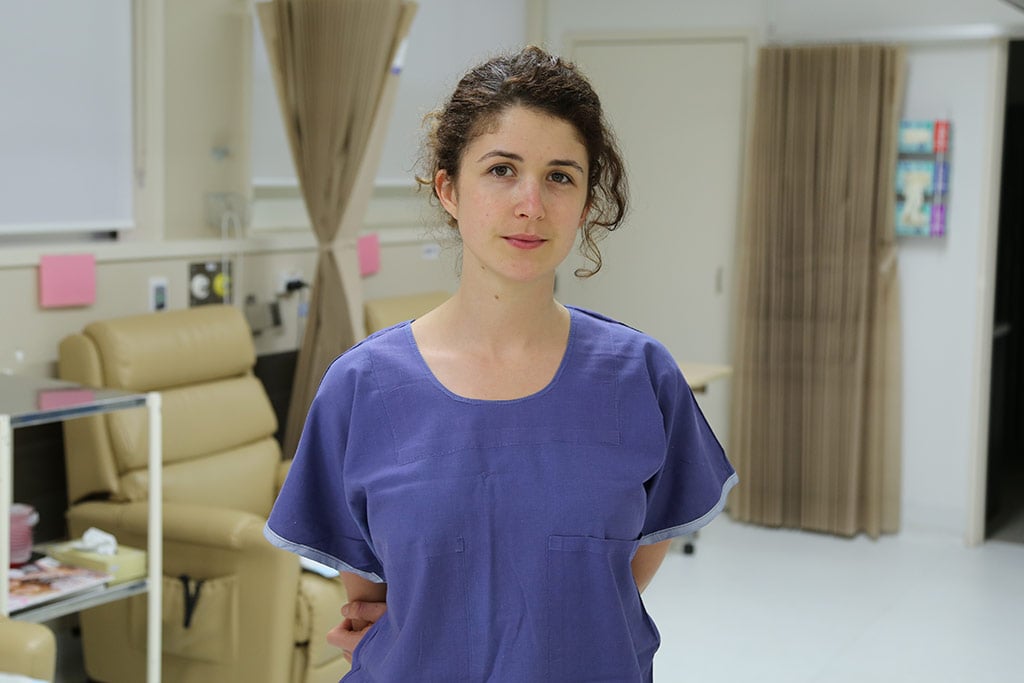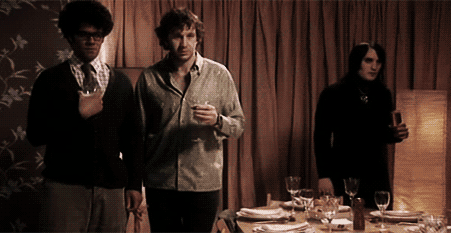The Best And Worst Bits Of Australia’s Most Controversial Jobs, With Filmmaker Maddie Parry
She's spent the past two years working in an abortion clinic, a brothel and a Tasmanian logging site for a new show. It premieres on ABC2 tonight.

When everyone’s small-talking at Christmas parties and family functions this holiday season, some conversations are going to be more awkward than others.
I, for instance, will have to explain to older relatives how my entire job is on the internet and, consequently, how the internet works. Students are going to get hounded for being lazy. Anyone who freelances or works for a startup will be propelled into an involved and frustrating conversation they’re likely too tipsy for. But others could have much bigger problems: it seems significantly simpler to tell a room full of strangers you’re a lawyer or accountant than a sex worker or a doctor at an abortion clinic.

Getting to know you/getting to know all about you.
Though you or I may not have any different reaction to jobs like this, they’re both undeniably still saddled with a fair bit of broader social stigma. Some people rally for their outright criminalisation and others have conflicting feelings from personal experience, religion and/or politics. Most notably, everyone has an opinion about them — informed or otherwise.
Possibly easing some of the burden off people at awkward Christmas lunches nationwide, a new documentary series is premiering on ABC2 tonight that tries to rectify some of this confusion and mystique. Exploring the day-to-day of “some of Australia’s most controversial workplaces”, filmmaker Maddie Parry has spent the past two years working as a support worker in an abortion clinic, a receptionist at a brothel, and a logger in a native Tasmanian forest. Her half-hour documentaries on each are premiering over the next three weeks.
“I wanted to make something insightful that shows an audience something they haven’t seen before, something that gives a deeper understanding of (or at least raises questions about) daily life,” she tells me. “I wanted to genuinely question my own beliefs too. I wanted to dig beneath the stereotypes of these industries and hear what the people who work day in and day out can reveal.”
“Work is just fascinating. We spend so many hours at a job; how do they affect how we see ourselves?”
Of course, this isn’t totally unchartered territory. It’s been more than a decade since Louis Theroux showed us what life was like in a legal Nevada brothel and a couple of years since US filmmakers Martha Shane and Lana Wilson interviewed some of the world’s only doctors who perform late-term abortions in After Tiller. However, the insight from Parry’s work will be uniquely Australian; a rare look inside the clinic down the road being picketed by angry old men and the worksite of those demolishing our previously protected forests.
Here’s a bit more of what you can expect:
–
Junkee: From your experiences, what was the best part of working at the abortion clinic?
Maddie: Witnessing people making a choice in situations that were very complicated. Life can be very unfair and tough, so both the women who chose to continue their pregnancy and those who chose to end it impressed me. I have so much respect for people making tough decisions despite what life throws at them. It really takes courage.
The worst part?
Seeing the grief of a mother and her child who was 14 years old and quite pregnant.
The most surprising?
How it’s kinda like any other workplace. It’s not all drama and pain. There’s laughter, paperwork and a sign above the sink asking all staff to do their own dishes. But also that so many women had already made their choice before arriving — counselling was offered but many had spoken with who they felt they needed to (be it family, their partner, friends or their own counsellor) and were clear in their choice.
From your experiences, what was the best part of working at the brothel?
There was a 24-hour jukebox and the ladies picked the songs so I guess… developing a love for Taylor Swift? Also, learning how sex work can be generous. It’s human to need intimacy and a connection and sex workers can provide this fundamental care. Sure, it’s with a limited time frame and restrictions, but still. What a precious thing to give someone through your work.
The worst part?
Seeing a man hit his limit on his credit card, which had been cut in half with scissors and sticky-taped back together. Just like a casino or pub, in a brothel some people are indulging; they’re addicted. And it was hard to see men who were fooling themselves that they’re experiencing real love when they pay. I guess sex work can seem like a no-strings-attached experience to some men, but it’s rarely that simple. When it goes bad, it can be upsetting.
The most surprising?
How much it unsettled me. I was told all relationships are transactions, and there’s some truth to that: we all barter, negotiate and trade in our relationships, sometimes with sex. I did go into these films to be challenged, but didn’t really expect my belief in relationships and love to be so shaken.
I was dating a guy in Melbourne at the time and I felt myself relate differently to him than I had in other relationships — I distanced myself and started keeping track on what I gave in terms of time and love and what I got back. It was pretty gross. So the blessing in disguise was that I really rejected this idea of love being a trade… it’s just not the whole story. We don’t only give and take. Relationships are about sharing; sharing moments and sharing intimacy, and building something together.
From your experiences, what was the best part of working as a logger?
I feel like I should say the early mornings and the birds, but I think the sunsets (it was winter and the sun went down early) won. That and one of the logger’s dad jokes. I love dad jokes. I’m still upset that I didn’t catch any on camera to put in the doco! Dad jokes can be very camera shy.
The worst part?
The sick feeling I got when trying to figure out if forestry (any forestry) was ever okay. It was so hard to know who to trust as well. I came to like and respect the loggers I worked with; they’re good men. But the claims and counter-claims on many issues surrounding logging is a symptom of the real lack of trust rotting the heart of this debate. Mistrust can really stall a discussion.
The most surprising?
I came to find an appreciation for large loud machinery. I have never been into trucks, or ever understood why people are. But now I think I do! Chainsaws, diggers, massive trailers… they’re all actually quite deft and can be elegant. I didn’t see that one coming.
Through all this you talk about “what you have to believe” to do these jobs. What do you have to believe to be a journalist and documentary-maker?
At times while making these docos I wondered if I was doing the right thing even exploring these topics. By showing the mundane and everyday nature of the brothel, was I removing the taboo and making it easier for men to enter a brothel and pay for sex? Are people inherently weak and does taboo and fear protect us from our weaknesses? Does talking about and normalising abortion falsely minimise the seriousness of the decision? Can I trust the loggers or is their world-view skewed because of the money they make off the industry?
I began to worry that maybe we can’t trust ourselves with the details. Maybe we need rules and simplified stereotypes to keep us out of trouble. But those moments of doubt didn’t last too long. I think we need to examine these tricky places to ensure, as a society, we’re taking the right approach. There are grey areas in life, and the people in these jobs sit right in the middle of them. They negotiate their way through the tricky, messy parts of life, which we all sometimes have to do.
–
Maddie Parry: Inside The Clinic is on iView now. Brothel Hostess will premiere December 9 at 9.30pm on ABC2 and Tassie Logging will follow on December 16.